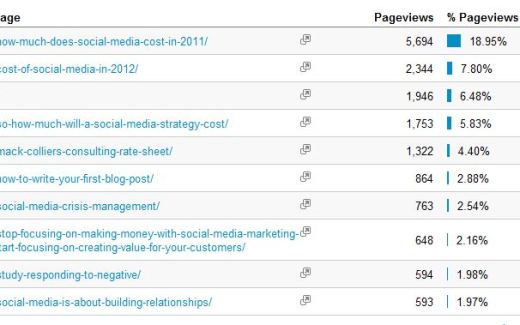I found an interesting bit of movie marketing news yesterday on Emily’s blog. She mentioned that the social media strategy for the April release The Five-Year Engagement includes a character blog! I’ve blogged about this for literally five years, but I think character blogs can be an amazingly smart vehicle for movies and television shows. Done right, it can be a completely immersive (did I just make up another word?) experience that extends the movie/show’s plot, and rewards its fans with a much deeper level of connection and engagement with the central characters. Seriously, it’s low-hanging fruit that too many media companies completely miss.
So when I saw Tom and Violet’s Our Wedding Blog, I was pretty excited. The blog is set up as a way for the movie’s two main characters to announce and walk their friends and family through their engagement and upcoming wedding. The blog has a ton of posts up, written by both Tom and Violet, and so far there’s even a video Tom has created.
Here’s the problem: You can’t comment on the blog posts. If you try, you’re greeted with a ‘ Comments are closed! Please sign our Guest Book!‘ explanation. What’s worse, the characters in the movie leave cutesy comments back and forth to each other in every post, but fans of the movie aren’t allowed to.
It just breaks your heart. By not allowing fans to comment on the posts, all Universal has accomplished is to lessen the amount of content that fans would create around this movie. Yes, opening up comments to the masses is going to create a LOT of extra work for the studio. They can expect to spend hours pouring through comments and moderating them.
But what happens when Leslie, who can’t wait to see this movie, leaves a comment on the blog telling Tom and Violet that she can’t wait for the wedding…and then sees it on the blog? Think that might get her excited? Think that might GREATLY increase the chance that she’ll blog about the movie, tweet about the movie, and mention it on Facebook?
And what if ‘Tom’ or ‘Violet’ actually RESPONDED to her?!?
Universal has in its hands a great opportunity to engage fans of this movie, and give them a reason to create content that will help the studio by increasing exposure and generating ticket sales. But they either can’t see the potential of letting ‘regular folk’ comment on the blog, or they do see the potential, and don’t think it’s worth devoting a few hours a week to moderating comments.
So close…













